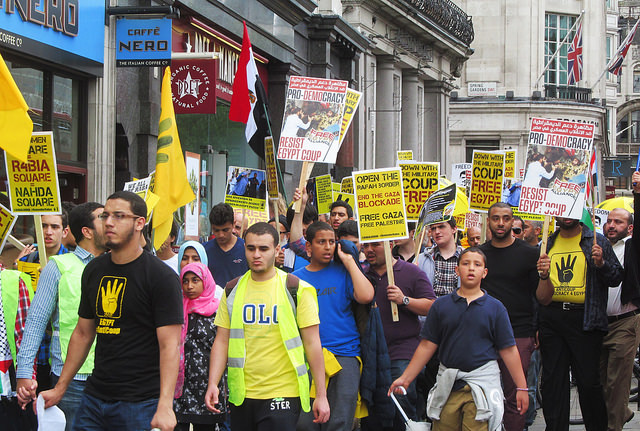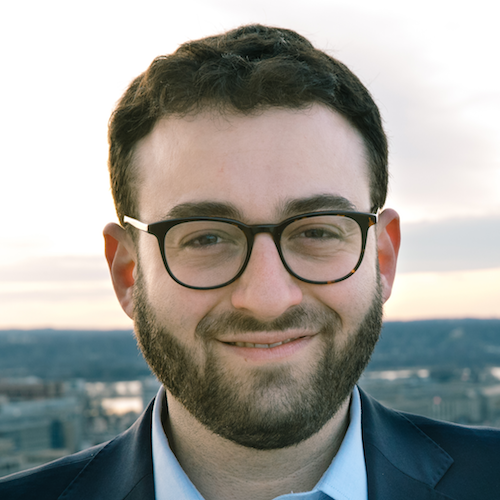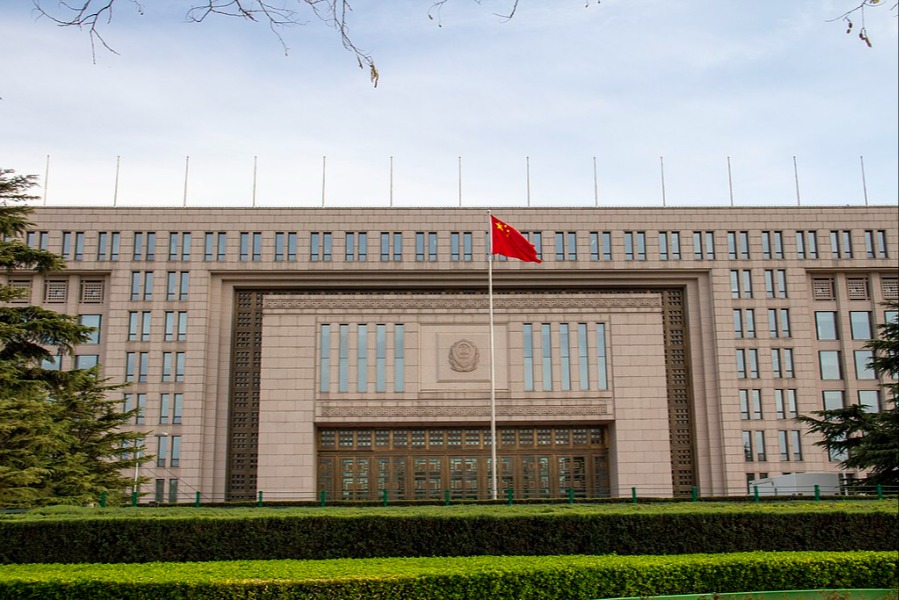Could President Trump Use the Treasury Department to Go After the Muslim Brotherhood?
The other day, Benjamin Wittes and Will McCants questioned whether the Trump administration could lawfully designate the Muslim Brotherhood as a Foreign Terrorist Organization (“FTO”). In the days since they wrote that post, there has been some talk that the administration may go a different direction: Treasury Department targeted financial sanctions.

Published by The Lawfare Institute
in Cooperation With

The other day, Benjamin Wittes and Will McCants questioned whether the Trump administration could lawfully designate the Muslim Brotherhood as a Foreign Terrorist Organization (“FTO”). In the days since they wrote that post, there has been some talk that the administration may go a different direction: Treasury Department targeted financial sanctions.
If lawyers at the State Department decide that Wittes and McCants are correct and the Brotherhood just doesn’t satisfy the statutory criteria for designation as an FTO, as the New York Times reported last night they may now believe, could President Trump’s Treasury still take action against the group? As a legal matter, the short answer is almost certainly yes. But doing so would pose some constitutional questions the government will need to consider seriously.
Sanctions and Statutes
For all intents and purposes, any sanctions program must derive its authority from a statutory grant by Congress; this grant is then implemented by regulation, executive order (“EO”), or some combination thereof. For example, one of Treasury’s main counter-narcotics sanctions authorities is derived from the Foreign Narcotics Kingpin Designation Act (see here for more information). And some sanctions regimes—like those targeting terrorism—are legally quite complex and can involve numerous statutes and departments.
As Ben and Will point out, FTO designations are made by State and are controlled by the Anti-Terrorism and Effective Death Penalty Act of 1996 (“AEDPA”) (codified at 8 U.S.C. § 1189). Designation as an FTO starts something of a legal Rube Goldberg machine. Criminal penalties attach to those who provide material support to an FTO and financial institutions have to freeze and report the existence of any relevant funds (18 U.S.C. § 2339B(a)(1)-(2)). Moreover, alien members or proponents of an FTO become inadmissible (8 U.S.C. § 1182(a)(3)(B)) or deportable (8 U.S.C. § 1227(a)(1)(A)). (For a more detailed overview of the FTO designation process, see this GAO Report).
But the FTO process is by no means the only sanctions tool the U.S. government uses to combat terrorism. Consider EO 13224, which Assistant Secretary of the Treasury Daniel Glaser, (then-Director of the Office of Terrorist Financing and Financial Crime) called “the U.S. government's primary and most public tool” in the fight against terrorist financing. As Undersecretary of the Treasury Adam Szubin (then-OFAC Director) explained:
[EO 13224] has proven to be a powerful and flexible tool—it allows us to designate and block the assets of individuals and entities controlled by or acting on behalf of named terrorist organizations, freezing any of the target’s assets that are held by U.S. persons and preventing U.S. persons from having any future dealings with them. Violations of the Executive Order are subject to civil and criminal penalties.
Zac Copeland recently looked at the history of EO 13224, which President Obama renewed twice, and which President Trump is almost certain to continue renewing.
IEEPA
For present purposes, what’s so interesting about EO 13224 is the statutory authority it was issued under: the International Emergency Economic Powers Act (“IEEPA”). As Copeland pointed out:
E.O. 13224 was issued under the International Emergency Economic Powers Act (IEEPA), which authorizes the President to declare a national emergency and provides him with sweeping economic and financial powers to respond to a crisis. Despite being enacted in 1977 to “limit the President’s emergency power in peacetime,” the IEEPA has been invoked by presidents in each successive administration to help them grapple with major international events, including the Iran hostage crisis, the Iraqi invasion of Kuwait, and the 2011 Libyan conflict.
Indeed, IEEPA is (perhaps accidentally) an incredibly broad grant of power, and one which the Supreme Court blessed in Dames & Moore v. Regan and secured safely in the exalted Zone One of Justice Jackson’s tripartite scheme in Youngstown Sheet & Tube v. Sawyer. As CarrieLyn Donigan Guymon pointed out, presidential decisions with respect to the declaration of national emergencies are seldom questioned by courts, paving the way for the access to the sort of financial blocking tools that form the heart of the sanctions toolkit:
Under IEEPA, the U.S. government does not take title to the property that is blocked, although there is no limit on the duration of the block or freeze. Before imposing any economic measures, the president merely needs to declare a national emergency with respect to the threat identified. . . . Despite some criticism of the manner in which presidents have exercised authority under IEEPA, U.S. courts typically decline to question the executive’s invocation of IEEPA to declare a national emergency.
The Supreme Court reinforced this overall theme of deference to the political branches last year in Bank Markazi v. Peterson.
As Applied to the Brotherhood
So where does this leave us with respect to the Brotherhood? As Ben and Will point out, the D.C. Circuit’s case law suggests it may not be chomping at the bit to give the President a blank check on FTO designations, substantively or procedurally. But the President probably doesn’t need an FTO designation to sanction the Brotherhood; IEEPA stands ready to do the heavy lifting. And President Trump could simply follow the model of President Obama’s recent actions with respect to Yemen.
On May 16, 2012, acting through his authority under IEEPA, President Obama signed EO 13611 which declared a national emergency with respect to stability in Yemen and authorized the imposition of sanctions against actors (and those who provide them support) who, amongst other things, “have engaged in acts that directly or indirectly threaten the peace, security, or stability of Yemen.” The President did not provide much detail regarding why, as the EO concluded, “these actions constitute an unusual and extraordinary threat to the national security and foreign policy of the United States.” Then again, given the case law surrounding IEEPA, he probably didn’t need to.
As of today, five people are sanctioned under EO 13611, including former President of Yemen Ali Abdullah Saleh. They all could, of course, challenge their designations in court. But the D.C. Circuit has made clear on numerous occasions (for example, in Holy Land Foundation v. Ashcroft in 2003 and in Islamic American Relief Agency v. Gonzales in 2007) that sanctions designations enjoy a highly deferential review. (For an overview of the designation process, see this 2010 testimony by then-Deputy Assistant Secretary Glaser.)
So if President Trump decided he really wanted to designate the Brotherhood, given IEEPA’s broad grant of authority, the obstacles he would face would likely be more questions of drafting than authority. If, for example, as Ben and Will point out, the Brotherhood is “is simply too diffuse and diverse to characterize,” the President could need to craft designation criteria carefully so as to capture those he wants to designate, and to allow for the formation of a sufficient administrative record.
If he did decide to proceed down this path, President Trump would, in accordance with the appropriate statutory authorities (50 U.S.C. § 1701 et seq., 50 U.S.C. § 1601 et seq.), issue an EO declaring a national emergency to deal with the identified threat (perhaps finding that the Brotherhood poses a threat to the stability of key regional allies who have reportedly advocated U.S. sanctions?). The EO would probably invoke IEEPA’s blocking authorities and include specific conduct- or status-based designation criteria (the difference between the two is explained in this GAO report). And while the abovementioned judicial deference makes it hard to predict what exactly would offend a reviewing court, President Trump would also have to defend his actions to Congress, who he would be statutorily required to notify. If Sen. Ted Cruz (R-TX) is any indication of prevailing congressional sentiment regarding the brotherhood, political backlash would not be much of a concern.
Constitutional Considerations
Nevertheless, there would be something unique about using IEEPA to target the Brotherhood; according to Will and Ben: it is unclear to what extent the group espouses violence. As the New York Times put it yesterday, “the Brotherhood used violence for decades in pursuit of its Islamist goals, but officially renounced it in the 1970s and embraced democracy as its means.”
To date, IEEPA has been used exclusively (or, at the very least, nearly exclusively) to target either state actors or their affiliates (e.g., Iraq) or non-state actors that are engaging in—or facilitating/enabling—violence (e.g., terrorists and their financiers, WMD proliferators, etc.). I am not aware of IEEPA having been used to target a group based on its political speech. This is not to argue that the Brotherhood is non-violent or unworthy of an FTO designation; I will leave that to Brotherhood experts, some of whom find evidence the group has advocated violence; some of whom disagree; and some who seem to say it depends. My focus here is simply on the law.
So given IEEPA’s extremely broad grant of power, how would a court handle a challenge to such an order if it concluded that the Brotherhood itself is not a violent terrorist group? Any attempt to answer this is necessarily speculative, but the Supreme Court’s decision in Holder v. Humanitarian Law Project raises some serious questions.
The petitioners In Humanitarian Law Project challenged the federal statute prohibiting material support to an FTO (18 U.S.C. § 2339B) insofar as it could prohibit their ability to do things like train members of two FTOs in international humanitarian law. Writing for the Court, Chief Justice John Roberts wholly rejected this:
The First Amendment issue before us is more refined than either plaintiffs or the Government would have it. It is not whether the Government may prohibit pure political speech, or may prohibit material support in the form of conduct. It is instead whether the Government may prohibit what plaintiffs want to do—provide material support to the PKK and LTTE in the form of speech. Everyone agrees that the Government's interest in combating terrorism is an urgent objective of the highest order. . . . The objective of combating terrorism does not justify prohibiting their speech, plaintiffs argue, because their support will advance only the legitimate activities of the designated terrorist organizations, not their terrorism. Whether foreign terrorist organizations meaningfully segregate support of their legitimate activities from support of terrorism is an empirical question. When it enacted § 2339B in 1996, Congress made specific findings regarding the serious threat posed by international terrorism. . . . One of those findings explicitly rejects plaintiffs' contention that their support would not further the terrorist activities of the PKK and LTTE: “[F]oreign organizations that engage in terrorist activity are so tainted by their criminal conduct that any contribution to such an organization facilitates that conduct.” . . . We are convinced that Congress was justified in rejecting that view. The PKK and the LTTE are deadly groups (emphasis in original).
As he continued, Roberts repeatedly came back to the ways in which Petitioners’ proposed speech—no matter how nonviolent—could make it easier for terrorist groups to perpetrate acts of violence:
Material support meant to “promot[e] peaceable, lawful conduct,” . . . can further terrorism by foreign groups in multiple ways. “Material support” is a valuable resource by definition. Such support frees up other resources within the organization that may be put to violent ends. It also importantly helps lend legitimacy to foreign terrorist groups—legitimacy that makes it easier for those groups to persist, to recruit members, and to raise funds—all of which facilitate more terrorist attacks. . . . The material-support statute is, on its face, a preventive measure—it criminalizes not terrorist attacks themselves, but aid that makes the attacks more likely to occur. . . . We also find it significant that Congress has been conscious of its own responsibility to consider how its actions may implicate constitutional concerns. . . . § 2339B only applies to designated foreign terrorist organizations. . . . [And] in effectuating its stated intent not to abridge First Amendment rights . . . Congress has also displayed a careful balancing of interests in creating limited exceptions to the ban on material support. The definition of material support, for example, excludes medicine and religious materials. . . . Finally, and most importantly, Congress has avoided any restriction on independent advocacy, or indeed any activities not directed to, coordinated with, or controlled by foreign terrorist groups.
But Roberts was also very careful to cabin the Court’s holding:
All this is not to say that any future applications of the material-support statute to speech or advocacy will survive First Amendment scrutiny. . . . In particular, we in no way suggest that a regulation of independent speech would pass constitutional muster, even if the Government were to show that such speech benefits foreign terrorist organizations. . . . We simply hold that, in prohibiting the particular forms of support that plaintiffs seek to provide to foreign terrorist groups, § 2339B does not violate the freedom of speech.
To put it simply, the Court in upholding the material support law gave significant weight to the Government’s claims that the kind speech at issue could further a terrorist group’s overall violent agenda.
But what if there is no official advocacy of (or organization of) violence? What if the group subject to sanctions were not a State-designated FTO like the PKK or the LTTE, but something closer to a group of religious radicals who officially profess nonviolence, but some of whom go off and do bad things? That issue was not before the Court in Humanitarian Law Project. But we can expect it to get a very hard look based on the distinctions Roberts made. Moreover, at least three members of the Court who dissented in the case (all of whom are still serving) might not be keen to extend the Court’s holding, especially if there is no evidence of incitement. From Justice Stephen Breyer’s dissent:
The plaintiffs do not propose to solicit a crime. They will not engage in fraud or defamation or circulate obscenity. . . . And the First Amendment protects advocacy even of unlawful action so long as that advocacy is not “directed to inciting or producing imminent lawless action and ... likely to incite or produce such action.” . . . Here the plaintiffs seek to advocate peaceful, lawful action to secure political ends; and they seek to teach others how to do the same. . . . Moreover, the Court has previously held that a person who associates with a group that uses unlawful means to achieve its ends does not thereby necessarily forfeit the First Amendment’s protection for freedom of association (emphasis in original).
Here’s the bottom line: IEEPA is an extremely powerful tool, the precise constitutional limits of whose exercise the courts may not have yet fully defined. If the President decides to deploy it against the Brotherhood, we may well learn that the First Amendment will not permit IEEPA to be used to restrict protected activity that lacks a clear nexus to either state-to-state international relations or to action against violent non-state groups.





